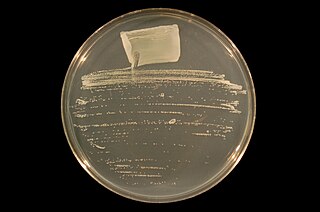
Ensifer is a genus of nitrogen-fixing bacteria (rhizobia), three of which have been sequenced.
Mesorhizobium tianshanense, formerly known as Rhizobium tianshanense, is a Gram negative species of bacteria found in the root nodules of many plant species. Its type strain is A-1BS.
Chelativorans multitrophicus is a Gram-negative, aerobic, non-motile bacteria from the genus of Chelativorans which was isolated from soil of activated sludge from industrial wastewater treatment plants in Switzerland. Chelativorans multitrophicus has the ability to degrade EDTA.
Streptomyces beijiangensis is a psychrotolerant bacterium species from the genus of Streptomyces which has been isolated from soil from Beijiang from the Xinjiang Uyghur Autonomous Region in China.
Streptomyces fukangensis is an alkaliphilic bacterium species from the genus of Streptomyces which has been isolated from desert soil from Xinjiang in China.
Arthrobacter liuii is a gram-positive, aerobic and non-motile bacterium species from the genus Arthrobacter which has been isolated from desert soil from Xinjiang, China.
Nocardiopsis is a bacterial genus from the family Nocardiopsaceae which can produces some antimicrobial compounds, including thiopeptides. Nocardiopsis occur mostly in saline and alkaline soils.
Altericroceibacterium xinjiangense is a Gram-negative, strictly aerobic, rod-shaped and non-motile bacterium from the genus Altericroceibacterium which has been isolated from desert sand from Xinjiang in China.
Pontibacter is a strictly aerobic bacterial genus from the family Hymenobacteraceae.
Roseomonas is a genus of Gram negative bacteria. The cells are coccoid rods when viewed microscopically. Certain species are known to be opportunistic infections for humans.
Roseomonas vinacea is a species of Gram negative, strictly aerobic, coccobacilli-shaped, wine-red-colored bacterium. It was first isolated from a soil sample collected from the Tibetan Plateau, China, and the species was first proposed in 2008. The species name is derived from Latin vinacea, referring to the color that the bacterial colonies form.
Falsirhodobacter deserti is a Gram-negative, aerobic, halotolerant, heterotrophic and non-motile bacteria bacterium from the genus of Falsirhodobacter which has been isolated from the desert of Xinjiang in China.
Streptomyces montanus is a bacterium species from the genus of Streptomyces which has been isolated from soil from the Mount Song.
Salinimicrobium catena is a Gram-negative, aerobic, heterotrophic and non-motile bacterium from the genus of Salinimicrobium which has been isolated from sediments oft the South China Sea.
Salinimicrobium terrae is a Gram-negative, obligately aerobic, non-spore-forming, slightly halophilic and non-motile bacterium from the genus of Salinimicrobium which has been isolated from saline soil from the Qaidam Basin in China.
Salinimicrobium xinjiangense is a Gram-negative, moderately halophilic, rod-shaped and non-motile bacterium from the genus of Salinimicrobium which has been isolated from a saline lake from Xinjiang in China.
Lysinibacillus cavernae is a Gram-positive, rod-shaped and motile bacterium from the genus of Lysinibacillus which has been isolated from soil from a karst cave in Libo County.
Alkalibacillus aidingensis is a Gram-negative, aerobic and motile bacterium from the genus Alkalibacillus which has been isolated from the Aiding Lake in the Xinjiang Province.
Tenuibacillus halotolerans is a Gram-positive, moderately halotolerant and rod-shaped bacterium from the genus of Tenuibacillus which has been isolated from soil from a salt lake from the Xinjiang Province.
Allorhizocola rhizosphaerae is a species of bacteria from the family Micromonosporaceae which has been isolated from rhizospheric soil from the plant Calligonum mongolicum from the Xinjiang Province.
